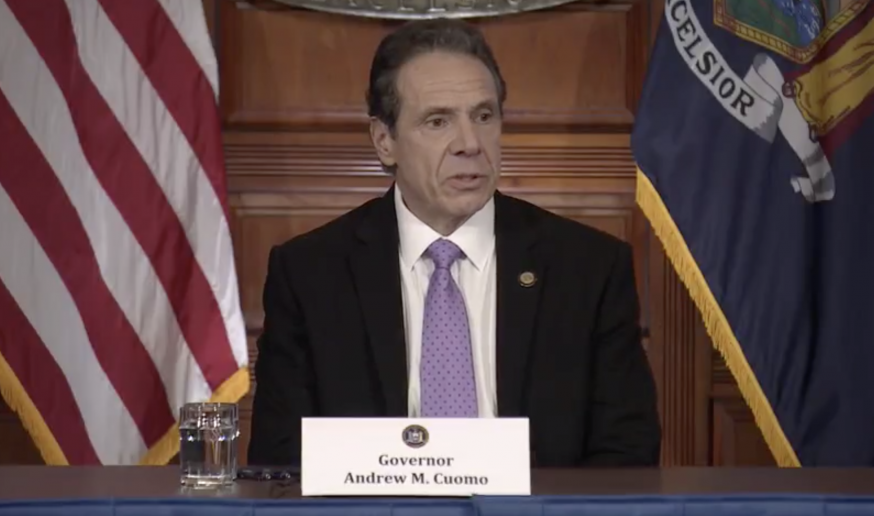
Gov. Andrew Cuomo briefing reporters Friday (Photo: Governor’s office)
March 20, 2020 By Allie Griffin
New York will essentially shut down on Sunday in order to slow the spread of the coronavirus, following an order Governor Andrew Cuomo announced in Albany today.
All non-essential businesses must close or have all employees work from home and New Yorkers should stay home as much as possible.
There are now 4,408 confirmed cases of COVID-19 in New York City and 7,102 cases across the state, Cuomo said this morning. Cuomo added that 35 state residents have died and about 18 percent of all cases have led to hospitalizations.
The rise in cases — though connected to increased testing — warrants the statewide shutdown in order to preserve the state’s healthcare capacity, Cuomo said.
“This is the most drastic action we can take,” Cuomo said. He referred to an analogy of flattening the curve, or reducing the spread of the coronavirus, by turning a public “density valve” tighter and tighter.
“We’re going to take it to the ultimate step, which is we’re going to close the valve,” Cuomo said. “Because the rate of increase in the number of cases portends a total overwhelming of our hospital system.”
The new restrictions include:
- – 100 percent of the workforce of non-essential businesses must stay home
- – all non-essential gatherings of individuals of any size are banned
- – people must practice social distancing of at least six feet from others in public
- – individuals should limit outdoor recreational activities to non-contact
- – individuals should limit the use of public transportation to only when absolutely necessary
- – sick individuals should not leave their home, unless to receive medical care
- – young people should practice social distancing and avoid contact with vulnerable populations
- – essential businesses should also implement rules that facilitate social distancing
Greater restrictions apply for more vulnerable New Yorkers who are at greater risk of severe illness and possible death if they contract COVID-19.
Seniors over 70, immunocompromised people and those with underlying illnesses, must remain indoors except to go outside for solitary exercise or medical attention. They should pre-screen all visitors and aides by taking their temperatures and wear a mask when in the company of others, who should also wear masks.
Members of the vulnerable group should also stay at least six feet from others and should not visit households with multiple people. They must not take public transportation unless “urgent and absolutely necessary.”
Cuomo said all the measures and restrictions introduced today are mandatory.
“These provisions will be enforced,” he said. “These are not helpful hints, this is not if you really want to be a great citizen — these are legal provisions, they will be enforced.”
Businesses not following the state’s order will be subject to civil fines and mandatory closures, the governor said.
Cuomo acknowledged that the new measures may not be popular with everyone and that businesses will close and people will be out of work, but said the state must be prepared for the worst.
“When we look back at this situation 10 years from now, I want to be able to say I can say to the people of the State of New York I did everything we could do,” Cuomo said. “This is about saving lives and if everything we do saves just one life, I’ll be happy.”
The governor rejected the notion that the shutdown was a “shelter-in-place” order. Instead he called it “PAUSE” which stands for “Policies Assure Uniform Safety for Everyone” and is working to get nearby states onboard.
The governor also acknowledged the devastating impact the measures will have on the economy and said New York will implement a 90-day moratorium on evictions for residential and commercial tenants.
Still New Yorkers’ lives come first, Cuomo said.
“I believe these policies will save lives and I’m not willing to put a price on human life.”
